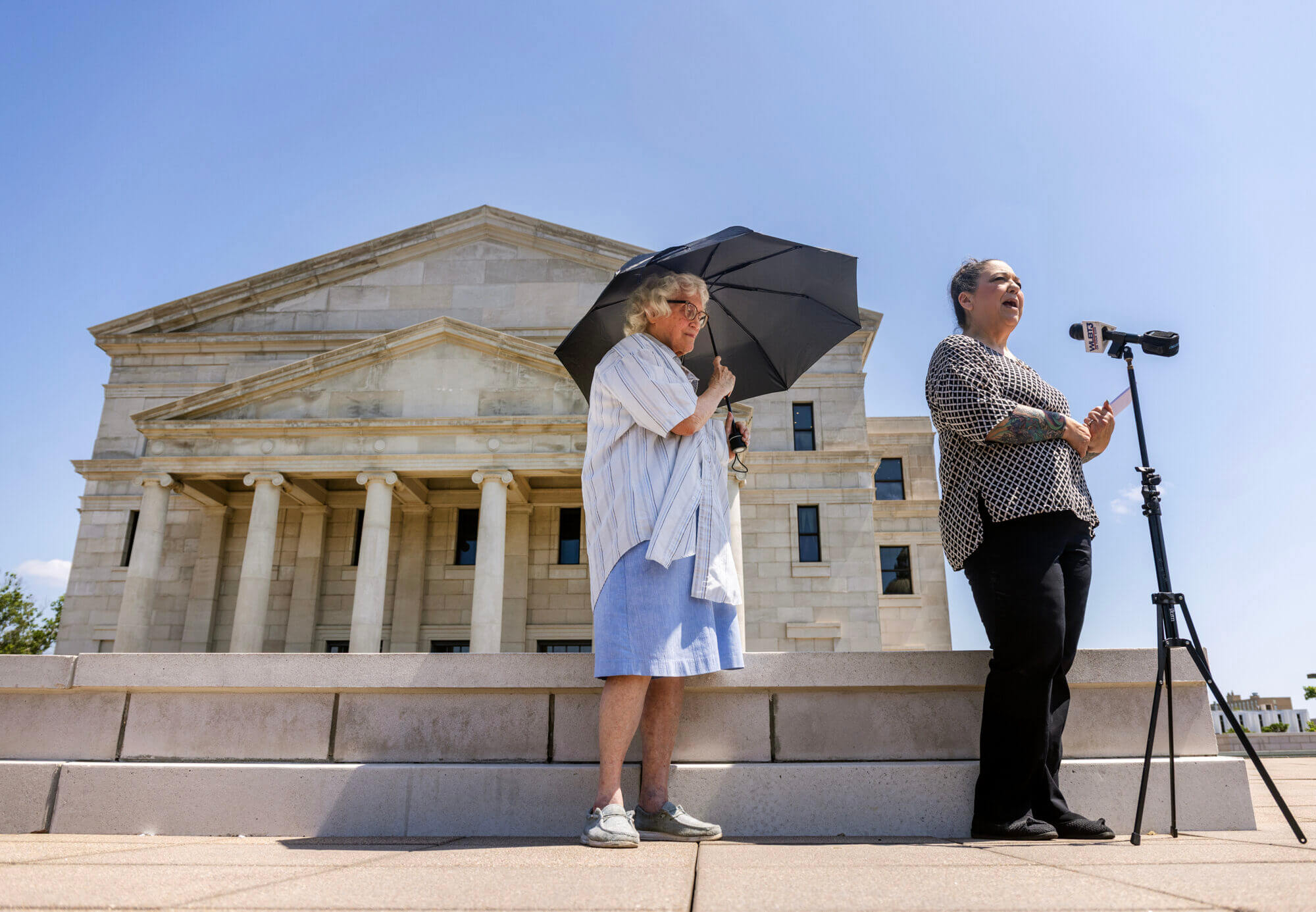


Four years ago, agents from the state auditor’s office arrested Tunica nonprofit operator Mardis Jones in what the office trumpeted as the second-largest embezzlement case in its history and demanded Jones return over $1 million to the state.
The charges accused Jones of stealing $750,000 from a home rehabilitation program he was supposed to be administering while turning away needy rural residents living in crumbling houses.
But his defense attorney attacked holes in the case, and last month, a local jury found Jones not guilty of the criminal charges. Now, the state has made no indication it will bring a civil case to try to claw back the money from him.
Jones’ nonprofit Tunica County Housing Inc. secured a subcontract with the county through the North Delta Regional Housing Authority in 2014 to run the county’s home rehabilitation program funded with casino revenue. For his work, vetting applications and managing expenses, Jones earned $12,000 a month.
At the core of the criminal case were “strange money transfers” and a finding that several of the people whose applications for home rehab were approved allegedly never received any repairs to their homes. According to the auditor’s office, investigators found less than 20% of the nearly $2 million Jones’ nonprofit received went to the contractors working to rehab homes.
“Once again, an arm of government trusted a private organization to run a government program, and a large percentage of the program’s spending was flat out stolen,” State Auditor Shad White said in a press release after the arrest.
Attorney General Lynn Fitch echoed White, saying, “These funds – hundreds of thousands of dollars – were meant to help the elderly, handicapped, and poverty stricken. But the funds never got to the vulnerable citizens who needed it most.”
Jones’ lawyer Carlos Tanner explained to Mississippi Today that the program operated with an extreme backlog, and that “some of the people they were claiming didn’t get their houses done actually did” by the time the trial was held this year.
The program was poorly administered, Tanner said, meaning that even if a person’s application was approved and a rehab contract prepared, county officials could direct Jones to put someone else’s repair job ahead of his or hers.
“But just because it was run like a first weekend lemonade stand does not mean Mardis Jones stole money,” Tanner said.
Tanner said the investigators gathered paltry evidence, only looking at details that fit their narrative. While Jones did earn a large salary through his contract, Tanner said prosecutors never presented evidence that Jones converted money that was supposed to be used on home rehabilitation to his personal use.
Investigators got a warrant to seize Jones’ electronics, Tanner said, but “they never bothered to search it.”
“The two OSA (Office of the State Auditor) officials who were running the investigation, I questioned them about it during trial, and neither of them could tell me where the computer was, where the phone was, or what the contents were,” Tanner said.
Jacob Walters, a spokesperson for the auditor’s office, defended the way the investigators handled the case, saying, “The state auditor’s office is never going to turn a case we investigated over to a prosecutor unless we’re fully confident in the work that we did.”
At the time the auditor’s office announced the Jones arrest, it also said it delivered a demand letter ordering Jones to repay over $1 million, the money it alleged he stole plus interest and investigative expenses.
It’s up to the attorney general or local district attorney to decide how to prosecute auditor investigations, or in Jones’ case, what happens to the civil demand now that a jury found him not guilty in the criminal case.
When a person receives a demand alongside his or her arrest, regardless of what happens with criminal charges, the claw back can be enforced through civil litigation — much like the case against several defendants in a stunning Mississippi Department of Human Services fraud case, which began in 2020 and has yet to be resolved. Walters said the demand against Jones is still the office’s next-largest in history, second only to the welfare scandal.
The government might choose to pursue civil litigation, even if criminal prosecution is unsuccessful, because there is a lower burden of proof to win civil cases.
But the attorney general’s office told Mississippi Today last month that it had not received the Jones demand letter from the auditor, meaning it has nothing left to enforce.
Walters said the auditor’s office sent the letter along with the case file four years ago, but that with a turnover in attorneys prosecuting the case, the auditor had to resend the file last year. If the attorney general’s office no longer possesses the demand document, Walters said, “it’s an incredibly easy problem to resolve.”
“Just reach out to us with a single phone call or email and we can get it to you,” Walters said.
After the interview, the auditor’s office sent the demand letter by email, and the attorney general’s office confirmed it was received.

A new Mississippi law that restricts diversity, equity and inclusion policies in education will harm the way schools teach about important historical events and people who challenged racism and segregation, Judy Alsobrooks Meredith says.
She is the wife of James Meredith, the man who faced a violent white mob when he became the first Black student to enroll in the University of Mississippi in 1962.
More than 100 relatives, friends and admirers gathered Wednesday night at Hal & Mal’s restaurant in Jackson to celebrate Meredith’s 92nd birthday. Many posed for photos with him, and Judy Alsobrooks Meredith spoke on behalf of the family.
She said the new anti-DEI law will make educators reluctant to teach about her husband or other important figures including Medgar Evers, the Mississippi NAACP leader who was assassinated in Jackson in 1963, and his wife, Myrlie Evers, who is still living and who became a civil rights leader in her own right.
“Y’all better start teaching your kids and your grandkids who they are,” said Alsobrooks Meredith, as the Evers’ daughter, Reena Evers-Everette, stood nearby.
A federal judge heard arguments Tuesday in a lawsuit that seeks to block the anti-DEI measure, which became law when Republican Gov. Tate Reeves signed it in mid-April.
The law prevents public schools from creating diversity, equity and inclusion offices; hiring people based on their race, sex, color or national origin; or engaging in “divisive” concepts, including teaching that a person “by virtue of his or her race, sex, color, national origin, is inherently racist, sexist, or oppressive.”
Legislative Democrats argued that the restrictions will force teachers to minimize ugly parts of history, including slavery and segregation. Republicans who pushed for the law said DEI concepts divide people into victims and oppressors.
With restrictions in schools and universities, Alsobrooks Meredith said it’s more important than ever for people to share their own family histories.
“Young people, start recording when you hear old folks talking … when you hear your mother, your grandmother, your great-grandmother talking about some stuff, start hitting the record button. Just do that. You’ve got to preserve,” she said. “To say that Medgar Evers and Myrlie Evers and James Meredith … they never existed. Well, that’s a lie born in hell.”





When incoming Jackson mayor John Horhn takes the reins next week, he will have the power to renegotiate many of the city’s hundreds of contracts, but with a notable exception: The hotly-debated garbage collection contract.
Generally, new mayors and governing boards possess the power to void and renegotiate contractual decisions made by their predecessors. But this rule does not apply to contracts that are time-specified by statute, such as the six-year solid waste collection contract penned by the city last year.
Since the Jackson City Council agreed to a $64-million contract with the New Orleans-based, minority-owned Richard’s Disposal in 2024, the city’s garbage contract likely won’t be reopened until at least 2030, after Horhn’s first term ends.
But the new mayor is expected to take a host of other contracts under review when he takes office on July 1.
Robert Gibbs, the chair of Horhn’s transition team, said they have obtained lists of hundreds of city contracts and grants to review with an eye toward efficiency and effectiveness but that it’s too early to say which ones could be renegotiated.
“For instance, when there has been a man shortage problem, (the city of Jackson has) been able to enter into contracts with companies that brought the manpower and the know-how,” Gibbs said this week on Mississippi Today’s political podcast The Other Side. “As we’ve looked at those, some of those are working very well, and we may very well continue those. But in other instances, there’s been a loss of employees for whatever reasons, and those departments have to be built back up.”
Gibbs added the transition team has heard complaints from local contractors who feel the city has been unreceptive to doing business with them.
An attorney, developer and local contractor himself, Gibbs was involved in the yearslong dispute between outgoing Mayor Chokwe Antar Lumumba and the city council over selecting a new garbage vendor, which spanned from 2021 to 2024. Gibbs’ company served as the minority subcontractor for Waste Management, the company that formerly held the contract and was vying for a renewal.
“You always hear about the dollar circulating in the community seven, eight times, and that’s important for your community to be profitable. But if those dollars go and leave your community, then you lose that seven or eight times effect,” Gibbs said. “And that’s what I’m afraid we’ve done with a couple of contracts in the city of Jackson.”
The pledge to review contracts has been welcomed by some city council members, including Ashby Foote, a representative for Ward 1 who has vocally opposed numerous city agreements in recent years, including the garbage contract.
“So much of this stuff has been outsourced because we haven’t had the personnel to do stuff that should’ve been done internally,” Foote said.
In particular, Foote noted that last year he voted with a majority of the city council to pay $700,000 to a local engineering firm for what he described as a one-year “contract to review contracts” in the public works department.
While Horhn will likely have the opportunity to renegotiate that contract early in his first term, he won’t be able to touch the garbage collection agreement without some effort.
In general, new mayors and governing boards in Mississippi have the power to rescind or modify city agreements, because that is what they’ve been elected to do, said Pieter Teeuwissen, a Hinds County Court judge.
But that rule does not apply to certain time-limited obligations that governments can enter, such as the issuing of municipal bonds, the leasing of sixteenth section lands or the collection of solid waste.
“The general rule is you want to give each successor governing authority as much opportunity as possible to have a say in the business of the city or county,” Teeuwissen said. “But the Legislature in its infinite wisdom has decided that certain types of contracts ought to carry a specific time. Someone who is buying $40 or $50 million in government debt doesn’t want to have to worry every four years that they’re gonna get canceled.”
The rules around time-limited contracts were the subject of a lawsuit that Teeuwissen brought against Hinds County for terminating his contract as board attorney before its one-year period expired. The 5th U.S. Circuit Court of Appeals agreed with him.
In the case of solid waste collection, state statute permits municipalities to sign six-year contracts, with options to extend the contract through four additional one-year periods.
This could be because garbage collection is considered an essential city service, Teeuwissen theorized, but he noted that almost any contract can be renegotiated if one party is intent on it, even as these laws are poorly understood by many attorneys in Mississippi.
“A good lawyer and a good set of facts can get you out of almost anything,” he said.
Marcus Wallace, a well-known city subcontractor, ran for mayor in the Democratic primary in part because he was unhappy with Lumumba’s approach to contracting. He said he’s hopeful the incoming administration will prioritize local contractors who can keep the city’s money in Jackson.
“Let the big companies pave your State Streets and your Northside Drives and Woodrow Wilsons, but when you go into these neighborhoods and these smaller streets – like a Valley Street – allow the smaller companies to do those jobs,” he said.
“We gotta start peeling back the layers to help businesses grow, and I really think Mayor-elect Hohrn is gonna do that part,” he added.

Richard Jordan, Mississippi’s longest serving and oldest death row inmate, died by lethal injection Wednesday evening at the Mississippi State Penitentiary nearly 50 years after he kidnapped and murdered Edwina Marter.
The 79-year-old Vietnam War veteran who experienced post-traumatic stress disorder was pronounced dead at 6:16 p.m.
“First I would like to thank everyone for a humane way of doing this. I want to apologize to the victim’s family,” Jordan said, adding thanks to his wife and lawyers and asking for forgiveness.
“I love you very much,” he said as his last words. “I will see you on the other side, all of you.”
Prison officials confirmed Jordan was unconscious after injecting a sedative before following with injection of two other injection drugs – a check ordered by a federal judge who greenlighted the execution late last week. This was part of a federal lawsuit challenging the lethal injection protocol in which Jordan was a lead plaintiff.
In January 1976, Jordan found himself desperate for money and made a plan to kidnap the family member of a bank employee and demand funds. The Vietnam War veteran had a job lined up and had moved his family to Louisiana, only to find the position was filled, according to his clemency petition.
He spent a few days looking for work before calling the Gulfport bank where Charles Marter worked as the commercial loan agent. Jordan found the man’s address in the phonebook and went there, posing as an electric company worker to get the banker’s wife, Edwina, to open the door at gunpoint. Her toddler son was left unharmed at home.
Jordan had Edwina drive to the DeSoto National Forest. As she tried to run away, Jordan shot in her direction, hitting her in the head. Afterwards, he called Edwina’s husband to demand $25,000 in ransom. After two failed money drops, Jordan was arrested.
He went to trial that year and received a death sentence, only for it to be overturned multiple times due to questions about the legality of Mississippi’s death penalty law. It wasn’t until 1998 and four trials later that the sentence stuck. Then Jordan began years of appeals.
Eric and Kevin Marter, the now-adult sons of Edwina, and her husband Charles did not travel to Parchman to witness the execution, but Edwina’s brother planned to attend with help of his family, Kevin Marter said.
Family members left without offering comment.
Ahead of the execution, Eric Marter said he wanted Jordan’s sentence to be carried out sooner rather than almost 50 years later after his mother’s death.
“I don’t want him to get what he wants,” Marter, who was 11 in 1976, said about Jordan’s efforts to fight his death sentence.
Jordan’s wife, Marsha, witnessed the execution along with his attorney Krissy Nobile of the Office of Capital Post-Conviction Counsel and his spiritual adviser, the Rev. Tim Murphy. Such advisers have been allowed to accompany death row inmates since a 2022 U.S. Supreme Court ruling.
After the execution, Attorney General Lynn Fitch said her office has pressed for justice and was pleased to be able to provide the Marter family, friends and the community with closure.
Leading up to the execution, Jordan petitioned the U.S Supreme Court and the U.S. 5th Circuit Court of Appeals to step in. The appeals court denied a stay of execution Tuesday, and the high court denied request for a stay and writ of certiorari Wednesday afternoon – about an hour before the execution.
Tuesday evening, Gov. Tate Reeves reviewed Jordan’s clemency petition and said he would not intervene in the execution, noting circumstances of the crime, how Jordan admitted his guilt, multiple trials and appeals.
Frank Rosenblatt, a professor at the Mississippi College School of Law, submitted the clemency petition that included letters of support from at least a dozen people, including Jordan’s wife, his sister and a pastor.
“Richard is all of these things: a patriot; a Vietnam Veteran; a man of faith; a good son, brother, and friend; and he is an exemplary inmate who has worked to prevent this type of crime from happening ever again,” Rosenblatt wrote in Jordan’s petition.
Organizations including Death Penalty Action and Catholic Mobilizing Network circulated petitions that called on Reeves to stop Jordan’s execution citing similar factors, including how he experienced post-traumatic stress disorder from his military service. Death Penalty Action’s petitions were delivered to the governor’s office Tuesday.
During an afternoon news conference, Parchman Superintendent Marc McClure said Jordan seemed talkative and was telling stories about his past. He had been moved to a holding cell Sunday evening, and before the execution he visited with family, his attorneys and spiritual advisers.
He requested chicken tenders, French fries, strawberry ice cream and a rootbeer float for his last meal, prison officials said at the earlier news conference.
Starting in the afternoon, demonstrators gathered outside Parchman in the Delta and the Governor’s Mansion in Jackson. Death Penalty Action also hosted a virtual vigil.
Minutes before the execution, a group gathered outside the prison entrance and offered prayers for Edwina Marter, her family, Jordan and his family. Among them were Rev. Jeff Hood, an Arkansas-based spiritual adviser who has accompanied 11 death row inmates to the execution chamber and has spoken out against the death penalty.
Jordan’s execution is the third in the past decade, with the most recent taking place in December 2022.
Thirty six people remain on death row in Mississippi, and the Attorney General’s Office is seeking execution dates for three – Willie Jerome Manning, Robert Simon Jr. and Charles Ray Crawford.
The Associated press contributed to this report

Kerlin Moreno-Orellana is facing deportation over a misdemeanor charge that usually results in a fine. He was picked up by Immigration and Custom Enforcement agents on Thursday morning and transferred from the Raymond Detention Center to an ICE detention center in Louisiana.
On June 16, Jackson police arrested Moreno-Orellana, a contractor, in south Jackson along with his employer Christy Parker, who was showing him one of the old properties she worked on. Both were charged with illegal dumping, but Parker claims they did not dump anything.
After detaining them, Jackson police called a local TV outlet, 16 WAPT News, to come shoot the scene of the arrest. Parker said they were kept in the police car for over an hour, waiting for the news crew. The WAPT newsroom explained that the Jackson police routinely asks them to cover arrests related to illegal dumping or other high profile cases, in order to “dissuade people.”
Once at the station, the Jackson Police Department called ICE on the 35-year-old father of four, who had worker authorization documents. He was kept in jail overnight, while Parker was released hours after their arrest.
“He didn’t do anything I didn’t do,” Parker said in an interview with Mississippi Today. “But because I’m white, I’m here?”
A municipal court ordered Moreno-Orellana’s release the day after, but ICE placed a detainer on him – a formal request to keep a non-citizen in custody for 48 hours, while the agency investigates. It is not an arrest warrant. However, a state law passed in 2016 mandates that all local law enforcement comply with ICE detainers placed on undocumented immigrants.
“What we are doing today is no different than what we’ve always operated when the detainer is sent by ICE to the jail,” said Hinds County Sheriff Tyree Jones. “Nothing has changed.”
While the Hinds County Sheriff’s Department has historically worked with ICE, Jackson police actively seeking out ICE to detain people is a fairly recent occurrence, said Mississippi-based immigration attorney Jeremy Litton. Jackson police did not respond to a request for comment.
ICE picked up Moreno-Orellana with hours left on his detainer, and he now faces deportation. ICE spokesperson Lindsay Williams said that Moreno-Orellana violated the conditions of a past bond agreement by being arrested for a new charge. He had already spent over a month in ICE custody in 2019, after getting arrested by park rangers for speeding and driving without a license.
Still, a minor misdemeanor charge – like illegal dumping – is normally insufficient for ICE to threaten to deport someone with worker authorization paperwork. Removal of a person with documentation is usually justified if the person is deemed a threat to public safety or national security.
“This does feel like a result of the elevated focus on deporting people from the Trump administration,” said Matt Steffey, professor at the Mississippi College School of Law.
Moreno-Orellana, who is from Honduras, has three boys and a girl, the youngest of whom is less than a year old. He has lived in Mississippi for over 16 years. Colleagues describe him as a valuable worker and a good friend.
“All he ever did was work and go home,” Parker said. “He was always willing to give somebody help.”
The possibility of his deportation is leaving his family in a precarious situation. Moreno-Orellana was the sole breadwinner of the family, and his wife worries about sustaining herself and their children without him.
“I’ve always dedicated myself to taking care of my kids at home, and he’s the one who brings food to the table,” his wife said in Spanish. “I’m afraid of staying, being without my children’s father. Not so much for me, but because they need him.”

We begin a series of podcasts with Mississippi Sports Hall of Fame’s Class of 2025, which will be inducted the first weekend in August. First up is highly successful baseball coach Scott Berry, who won big first at Meridian Community College and then at Southern Miss.
Stream all episodes here.

Mississippi Institutions of Higher Learning and Jackson State University have reached a tentative agreement to settle the months-long federal lawsuit filed by a former faculty senate president who was placed on leave pending termination last fall. The settlement would give Dawn Bishop McLin her job back as a tenured professor.
McLin’s case is the latest in a series of lawsuits against the state’s college governing board and the historically Black university. Two others have cited gender discrimination when it comes to the board’s presidential search and its selection process.
The proposed agreement, which is still being hammered out by attorneys, would return McLin to her position as psychology professor. It would also restore the roughly $38,000 in research grants she lost after her termination, as well as $10,000 in pay for summer school courses she would have taught this semester, all totaling $48,000.
IHL attorney Pope Mallette also requested a motion for the settlement agreement to be closed to the public, which prompted U.S. District Judge Henry Wingate to question the move by the taxpayer-funded governing board.
“The court does not seal public money,” Wingate said in response to Mallette’s request.
The parties spent much of the morning in separate rooms discussing the settlement and hashing out attorney fees.
Last year a faculty panel reviewed the university’s basis for McLin’s termination and recommended she be reinstated to her job “as a tenured faculty member fully restored,” the original court filing states.
The exact circumstances of her termination weren’t released, but members of the faculty senate executive committee have said McLin was apparently placed on leave without any written warning and accused of harassment, malfeasance and “contumacious conduct,” a term stemming from IHL policies that means insubordination.
Marcus Thompson, who has since resigned as Jackson State University president, did not respond to the panel’s recommendation, putting McLin in a state of limbo, ultimately forcing her to resign.
McLin, who was elected as JSU’s faculty senate president in 2020, received support from the American Association of University Professors, a national organization that backs academic freedom, and fellow colleagues following her termination. Thompson ignored multiple letters from the professional organization.

Editor’s note: This story was updated Tuesday afternoon to reflect Gov. Tate Reeves’ statement.
Gov. Tate Reeves says he will not block the execution of Mississippi’s oldest and longest-serving inmate, which is set for Wednesday evening.
Reeves said in a statement Tuesday that he rejected a clemency petition for Richard Jordan. The Republican governor said Jordan admitted being guilty of kidnapping Edwina Marter, at gunpoint, from her family’s home in coastal Harrison County in 1976 while her 3-year-old son was sleeping, and of forcing Marter to drive into a forest and killing her by shooting her in the back of the head.
“Following this premeditated and heinous act, Mr. Jordan demanded and was paid a $25,000 ransom prior to being apprehended by law enforcement,” Reeves said.
Jordan, 79, is scheduled to be executed by lethal injection at the Mississippi State Penitentiary at Parchman.
Reeves said considering clemency requests in death penalty cases is “a somber responsibility” that he takes seriously.
“Justice must be done,” he said.
The governor issued his statement hours after a prison reform advocate publicly implored him to spare Jordan’s life.
“I’m here today to ask our Christian governor to do the Christian thing and show mercy – mercy on a man that has spent 49 years in prison and has done everything he could do to atone for his crime,” Mitzi Magleby said outside the Mississippi Supreme Court.

Reeves declined to block the only two executions Mississippi has carried out since he became governor – one in 2021 and one in 2022.
Jordan was first convicted in 1976 for kidnapping and killing Marter, and it took four trials until a death sentence stuck in 1998.
One of Marter’s sons said Jordan should have been executed long ago.
“I don’t want him to get what he wants,” Eric Marter, who is 59 and lives in Lafayette, Louisiana, told Mississippi Today. “If you want to spend the rest of your life in jail, then I would rather you not get that, and if that means you get executed, you get executed.”

The 5th U.S. Circuit Court of Appeals on Tuesday denied Jordan’s request for a stay of execution. Jordan had a separate request for a stay awaiting consideration at the U.S. Supreme Court.
The appeals court wrote that Jordan has received repeated review of his claims in state and federal courts for nearly 50 years.
At this point, “finality acquires an added moral dimension,” the appeals court wrote. “Only with an assurance of real finality can the State execute its moral judgment in a case. Only with real finality can the victims of crime move forward knowing the moral judgment will be carried out.”
Magleby, who has met Jordan, said he has been a model prisoner and is extremely remorseful. She said she believes life without parole would be a sufficient and humane punishment.
“I believe that it is more of a penalty to do life without parole,” she said. “The death penalty gives you an out-date. Life without parole does not.”
She also delivered a petition asking Reeves to prevent Jordan’s execution. That petition had more than 3,000 signatures.

The news conference was put on by Magleby and Death Penalty Action, who are supporters of Jordan’s cause.
If Jordan’s execution goes forward as scheduled, supporters plan to hold protest vigils Wednesday outside Parchman and the Governor’s Mansion and online.
Human rights group Amnesty International released a statement Tuesday opposing the execution.
“Governor Tate Reeves is the only person with the power to spare Jordan’s life,” the group said. “He must use this power to halt this execution, commute Richard Jordan’s sentence and work towards ending the death penalty in Mississippi more broadly.”

Editor’s note: This essay is part of Mississippi Today Ideas, a platform for thoughtful Mississippians to share fact-based ideas about our state’s past, present and future. You can read more about the section here.
Mississippi’s public school teachers and students keep racking up wins for our state.
A few months ago, we received terrific news regarding the latest national test scores. Our fourth-graders earned a ninth-in-the-nation overall ranking in reading and 16th place in math. Mississippi students did similarly well on state tests, achieving the highest proficiency rates ever logged on those assessments.
The recently released Annie E. Casey Foundation’s KIDS COUNT 2025 Data Book now ranks Mississippi 16th in the nation for education — an incredible leap from 30th in 2024 and 32nd in 2023.
National media outlets have proclaimed our students’ remarkable rise in academic proficiency to be the “Mississippi Miracle,” inspiring other states’ education leaders to ask how they can be more like us.
Without a doubt, the progress made in Mississippi’s public schools is a direct result of the tireless efforts of our public school teachers and students. Their impressive work has been bolstered by tens of thousands of parents and community leaders who have been standing in the gap for decades, fighting for better school resources and, importantly, against the billionaire-backed campaign to undermine public education through private school voucher programs.
Other states have fallen victim to the voucher lobby, swayed by the millions of dollars spent pressuring them to adopt so-called “school choice” policies. Mississippi’s legislators, however, have resisted school choice, standing with their constituents and refusing to gamble with our children’s futures, thereby avoiding the financial and academic pitfalls suffered in states that embraced voucher schemes.

But a piece of legislation moving through Congress poses a significant threat to our state’s education progress.
The sweeping federal budget bill, HR 1 (the One Big Beautiful Bill Act), includes a dangerous provision that would impose a nationwide tax-credit voucher program, overriding the will of states like Mississippi and threatening our historic progress.
These few paragraphs tucked into a massive federal budget bill would jeopardize the gains our students have worked so hard to achieve while adding $5 billion a year to the federal deficit.
Mississippi isn’t alone in opposing school choice schemes. Voters across the country have rejected voucher proposals every single time they’ve appeared on statewide ballots. Unfortunately, some state legislatures have ignored their constituents in favor of voucher lobbyists and donors, legislating voucher programs with devastating consequences: severe state budget shortfalls and flagging student achievement. In fact, every state named by EdChoice as a “Top 10 School Choice State” has seen academic performance decline precipitously while Mississippi’s results keep rising.
If HR 1 were to become law with the voucher provision intact, it would set Mississippi back decades and establish a dangerous precedent: allowing private interests to decide which of the country’s children will be educated with federal dollars.
The bill already has passed the House and now awaits action in the Senate where Mississippi’s own senators — Roger Wicker and Cindy Hyde-Smith — could play a critical role in removing the tax-credit voucher language from the legislation. Both senators enjoy significant influence in the U.S. Senate, influence that is heightened in this case by what is expected to be a very close vote.
We urge them to consider these key points:
Nancy Loome is executive director of The Parents’ Campaign (msparentscampaign.org) and president of The Parents’ Campaign Research & Education Fund (tpcref.org). She and her husband Jim have three grown children, all of whom graduated from Clinton Public Schools.